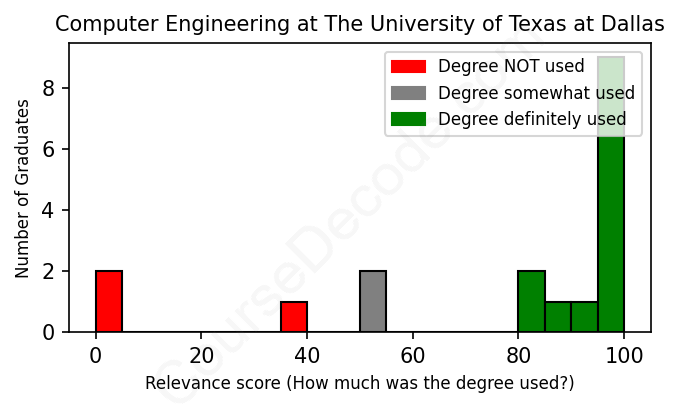
First, some facts. Of the Computer Engineering graduates from The University of Texas at Dallas we've analyzed , here's how many have used (or NOT used) their degree in their career:

These are estimates based on AI analysis of 18 LinkedIn profiles (see below).
The verdict? Above average. Overall, with an average relevance score of 76%, Computer Engineering graduates from The University of Texas at Dallas have a higher likelihood (+9%) of finding work in this field compared to the average graduate across all fields:
And for comparison, here's the chart for all profiles we've looked at across all degrees.
Also, after graduating, only 27% of these graduates have pursued further education other than another Bachelor's degree (such as a Masters degree or other), compared to the average across all profiles of 35%. This suggests a Bachelors degree is enough for most Computer Engineering graduates, and it's normal to look for work straight after graduation.
See the details:
|
Relevance score: 100% We think this person has gone into a career highly relevant to their degree. We think this person has gone into a career highly relevant to their degree.
DEGREE INFOGraduated in 2022 from The University of Texas at Dallas with a Bachelor of Science - BS in Computer Engineering. No other secondary education since. JOB HISTORY SINCE GRADUATIONAssociate Software Engineer L3Harris Technologies Aug 2022 - Mar 2024 Senior Associate Software Engineer  L3Harris Technologies Mar 2024 - Present ABOUTLifelong tinkerer with a high success rate of putting things back together. Most interested in embedded systems, computer graphics, game engines, and the points in which hardware and software meet. |
The top 10 most common jobs done by the graduates we've analyzed (ranked most common to least) are:
From analyzing the LinkedIn profiles of graduates from The University of Texas at Dallas with a degree in Computer Engineering, it's clear that the most common types of jobs fall into software development, engineering roles, and consulting positions. Many graduates have secured roles as Software Engineers or Developers at big companies like State Farm, which directly utilize the programming skills and design principles they learned in their degree. Meanwhile, engineering positions like Electrical Engineer and various consultancy roles also show a significant representation among these graduates, often requiring a solid foundation in engineering concepts.
However, not all job roles are directly aligned with computer engineering principles. Some individuals found themselves in positions unrelated to their field, such as bagging groceries or dealing with customer service. While some roles do have a technical aspect, they may not rely heavily on the core engineering knowledge, like product testing and marketing positions. Overall, while many graduates have successfully leveraged their degrees into relevant work, there is a noticeable number of roles that do not make full use of their Computer Engineering background, especially in the early stages of their careers. This suggests that while the degree is versatile and can lead to numerous opportunities, not all paths taken directly reflect the skills learned during the program.
Here is a visual representation of the most common words in job titles for Computer Engineering graduates (this is across all Computer Engineering graduates we've analyzed, not just those who went to The University of Texas at Dallas):

Graduates from the Computer Engineering program at The University of Texas at Dallas seem to generally have solid career trajectories, particularly in software and electrical engineering roles. Many of them land jobs in technical positions right after graduation, often as software engineers or developers at well-known companies like State Farm and Raytheon. For instance, in the early years after graduation, positions like Product Test Engineer, Electrical Engineer, and various software roles show that graduates are getting their foot in the door at reputable organizations. Most of them appear to stay on a relevant career path, moving up to senior roles and even specialized positions like Software Architect or Senior Electrical Engineer within just a few years.
Looking at what people are doing five or ten years down the line, the trend continues to be pretty positive. For example, alumni who started as software engineers or product engineers often transition into senior management or specialized technical roles, and a few have even started their own ventures or taken on substantial leadership positions. While there are some outliers who took less direct paths, such as working in retail for a short stint, the overarching narrative is that the majority of UT Dallas Computer Engineering graduates are building successful careers in areas that leverage their expertise. Overall, it looks like this program sets you up well for a stable and rewarding career, with graduates making impactful contributions in fields like technology and engineering.
So, getting a Bachelor’s in Computer Engineering can be a bit of a mixed bag, and honestly, it tends to be on the tougher side compared to some other degrees. At The University of Texas at Dallas (UTD), you can expect a solid curriculum with a good mix of math, programming, and hardware concepts, which can be pretty challenging if you’re not totally into those subjects. You’ll dive into things like circuits, algorithms, and software development, and while it’s definitely manageable if you stay organized and work hard, it can feel overwhelming if you’re not prepared for the workload. Overall, it’s a rigorous program but definitely doable for those who are committed and curious about the tech world!
Most commonly, in the LinkedIn profiles we've looked at, it takes people 4 years to finish a Bachelor degree in Computer Engineering.
Looking at these Computer Engineering graduates from The University of Texas at Dallas, it seems like they’ve mostly landed pretty decent jobs, especially considering the field they’re in. The older grads, like the one who went from Product Test Engineer to Senior Consultant and Software Architect, are likely pulling in a solid income as they’ve climbed the ladder in consulting. On the other hand, some of the recent grads are still getting their feet wet in entry-level positions or internships, like the ones working at Kelsey-Seybold Clinic, which might not pay as much right now but can lead to better opportunities later. Overall, those who have stuck with tech roles at established companies like State Farm and Raytheon seem to be on a good track for some decent pay. It just goes to show that it pays off to be patient and keep working your way up!
Here is a visual representation of the most common words seen in the "about" section of LinkedIn profiles who have a Bachelor degree in Computer Engineering (this is across all Computer Engineering graduates we've analyzed, not just those who went to The University of Texas at Dallas). This may or may not be useful:

Here are all colleges offering a Bachelor degree in Computer Engineering (ordered by the average relevance score of their Computer Engineering graduates, best to worst) where we have analyzed at least 10 of their graduates:
| College | Score | Count |
|---|---|---|
 University of Florida University of Florida
|
95 | 18 |
 Michigan State University Michigan State University
|
94 | 10 |
 Brigham Young University Brigham Young University
|
94 | 10 |
 Penn State University Penn State University
|
92 | 14 |
 California Polytechnic State University-San Luis Obispo California Polytechnic State University-San Luis Obispo
|
91 | 14 |
 University of Central Florida University of Central Florida
|
90 | 14 |
 Georgia Institute of Technology Georgia Institute of Technology
|
90 | 14 |
 Purdue University Purdue University
|
86 | 34 |
 University of Illinois at Urbana-Champaign University of Illinois at Urbana-Champaign
|
86 | 30 |
 Iowa State University Iowa State University
|
86 | 25 |
 Texas A&M University Texas A&M University
|
85 | 17 |
 San Jose State University San Jose State University
|
85 | 16 |
 Clemson University Clemson University
|
85 | 14 |
 Dwarkadas J. Sanghvi College of Engineering Dwarkadas J. Sanghvi College of Engineering
|
85 | 10 |
 North Dakota State University North Dakota State University
|
84 | 12 |
 Savitribai Phule Pune University Savitribai Phule Pune University
|
83 | 25 |
 University of Mumbai University of Mumbai
|
82 | 43 |
 New Jersey Institute of Technology New Jersey Institute of Technology
|
81 | 11 |
 University of North Carolina at Charlotte University of North Carolina at Charlotte
|
79 | 11 |
 California State Polytechnic University-Pomona California State Polytechnic University-Pomona
|
76 | 11 |
 The University of Texas at Dallas The University of Texas at Dallas
|
76 | 18 |
 University of South Florida University of South Florida
|
69 | 10 |
 Gujarat Technological University, Ahmedbabd Gujarat Technological University, Ahmedbabd
|
55 | 13 |